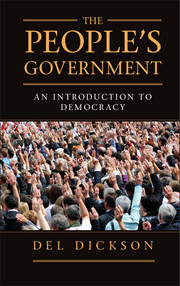Book contents
- Frontmatter
- Contents
- Acknowledgments
- Prologue
- 1 Liberty and Freedom
- 2 Freedom or Liberty?
- 3 Rights
- 4 Participation and Representation
- 5 Inclusion
- 6 Equality
- 7 Power
- 8 The Case against Democracy
- 9 The Case for Democracy
- 10 Building a Stable Democracy
- 11 Three Misconceptions about Democratization
- 12 How Democracies Die
- 13 How Democratic Is the United States?
- Glossary and Biographies
- Bibliography
- Index
4 - Participation and Representation
Published online by Cambridge University Press: 05 August 2014
- Frontmatter
- Contents
- Acknowledgments
- Prologue
- 1 Liberty and Freedom
- 2 Freedom or Liberty?
- 3 Rights
- 4 Participation and Representation
- 5 Inclusion
- 6 Equality
- 7 Power
- 8 The Case against Democracy
- 9 The Case for Democracy
- 10 Building a Stable Democracy
- 11 Three Misconceptions about Democratization
- 12 How Democracies Die
- 13 How Democratic Is the United States?
- Glossary and Biographies
- Bibliography
- Index
Summary
Should democracies rely on direct citizen participation, or should governance be left to representatives? Is government a do-it-yourself job, or is it best contracted out to professionals, subject to some degree of public accountability and consent?
Free democrats prefer participatory democracy; liberal democrats favor representative democracy. Free democrats see value in political participation, whereas liberal democrats are skeptical of direct democracy and worry about the consequences of having “too much” democracy.
PARTICIPATION AND DIRECT DEMOCRACY
In participatory democracies, citizens are encouraged, expected, and sometimes required to engage in politics and government. Participatory democracy depends on an active and informed citizenry to make important policy decisions, rather than leaving them to representatives or civil servants.
It might seem that free and participatory democracies are the same thing, but they are not quite synonymous. All free democrats are participatory democrats in theory, but in practice they invariably must rely, to some degree, on representatives and civil servants – a necessity in the era of large nation-states. Conversely, some liberal democrats, notably John Stuart Mill, value the educative benefits of political participation. As a rule, however, free democrats place a much higher value on political participation than do liberal democrats. Participation in liberal democracies usually ends where participation in free democracies begins: voting in periodic elections.
- Type
- Chapter
- Information
- The People's GovernmentAn Introduction to Democracy, pp. 39 - 56Publisher: Cambridge University PressPrint publication year: 2014



